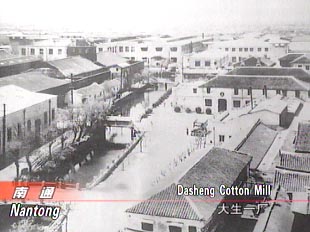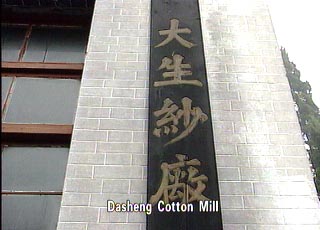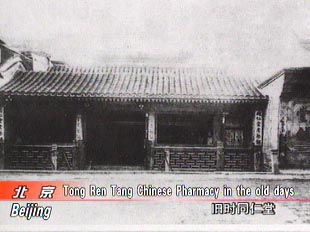 |
|
Delayed Reform (6)
Encouraging Industrialists |
| CCTV.COM 2002-05-17 03:05:34 |
|
At the beginning of the 20th century, China's cigarette market was monopolized by British and American tobacco companies.
 In 1905, overseas Chinese Jian Zhaonan and his brother Jian Yujie founded the Nanyang Brothers Tobacco Company Ltd. in Hong Kong. Their cigarettes were packed with distinctive national features. A lot of Chinese characters were printed on the cigarette case. They explained that the Great Wall was the brand of the cigarettes and their flavour excelled that of imported cigarettes. From the Chinese brand of cigarettes we can imagine how difficult it was to develop the national tobacco industry. In 1905, overseas Chinese Jian Zhaonan and his brother Jian Yujie founded the Nanyang Brothers Tobacco Company Ltd. in Hong Kong. Their cigarettes were packed with distinctive national features. A lot of Chinese characters were printed on the cigarette case. They explained that the Great Wall was the brand of the cigarettes and their flavour excelled that of imported cigarettes. From the Chinese brand of cigarettes we can imagine how difficult it was to develop the national tobacco industry.
In 1903, the Qing government established the Ministry of Business and laid down regulations on encouraging companies, bankruptcy law and other business laws. These policies provided favourable conditions for the development of private enterprises.
 Zhang Jian gave up the post of the Number One Scholar and dedicated himself to business. In 1899, he started the Dasheng Cotton Mill in his hometown Nantong. Zhang Jian gave up the post of the Number One Scholar and dedicated himself to business. In 1899, he started the Dasheng Cotton Mill in his hometown Nantong.
Zhang Jian's granddaughter Zhang Rouwu said "My grandfather set up the Dasheng Cotton Mill. The Japanese purchased cotton at low prices in Nantong, then they sold us semi-finished or finished products at high prices. My grandfather said it was something like feeding a tiger with meat. But it was very difficult to do things in those days. He went to Shanghai and begged Zhang Zhidong for help."
In 1904, Zhang Jian extended the Dasheng Cotton Mill. He added more than 20,000 spindles and doubled the number of facilities. He believed that since China was economically weak, it could only concentrate on the development of cotton industry and farming. He said the cotton textile industry required limited investment, had quick capital turnover and earned profits easily, so major efforts should be made to develop this industry.
During the period of New Policies, old-type businesses like Tong Ren Tang Chinese Pharmacy introduced a capitalist way of management. Xu Yefen was the woman manager. Born of a noble family, she attended to everything herself. She knew her subordinates well and always put them where they could give full play to their abilities. Her handwriting can still be seen from the cover of the catalogue of medicine and the brick carving on the front door.
 Xu Yefen was good at accepting new ideas. She worked out a system of low pay plus a percentage taken from the proceeds of sale. A worker got a monthly pay of one or two silver dollars and an extra income from the daily proceeds of sale. At 12 o'clock every day when the midday gunshot was heard from Tian'anmen, the total proceeds of sale of the day were calculated. The salesclerks could get 3 percent of the proceeds of sale at most. Such a pay system was effective at Tong Ren Tang Chinese Pharmacy for half a century. Xu Yefen was good at accepting new ideas. She worked out a system of low pay plus a percentage taken from the proceeds of sale. A worker got a monthly pay of one or two silver dollars and an extra income from the daily proceeds of sale. At 12 o'clock every day when the midday gunshot was heard from Tian'anmen, the total proceeds of sale of the day were calculated. The salesclerks could get 3 percent of the proceeds of sale at most. Such a pay system was effective at Tong Ren Tang Chinese Pharmacy for half a century.
In the business boom, the political status of businessmen was raised greatly.
Zhang Jian was rewarded and promoted time and again. Zhang Bishi, founder of Zhangyu grape wine, was granted the first-class official hat accessories. Zhu Dachun of Yuanchang Machinery and Hardware Plant got the second-class official hat accessories.
The New Policies were introduced towards the end of the Qing Dynasty. The business wave encouraged by the government changed more or less the old Chinese tradition of valuing agriculture and belittling business. More and more people invested in businesses. A new boom of factories and mines appeared in China between 1905 and 1910. This provided favourable conditions for the development of capitalism in China.
|
|
|
|
|
|
|
 |









